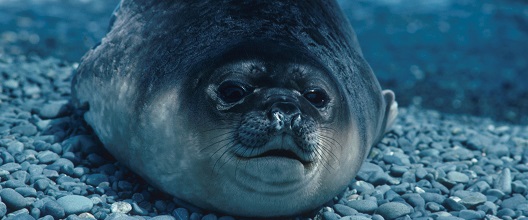St Andrews scientist awarded Polar Medal

Professor Ian Boyd FRSB FRSE, former director of the University of St Andrews Sea Mammal Research Unit, has been awarded the Polar Medal in recognition of his research on the ecology of seals around South Georgia.
The Polar Medal is given by Her Majesty the Queen to acknowledge valued service given in the Polar Regions.
Professor Boyd, now Chief Scientific Adviser at DEFRA, worked with the British Antarctic Survey from 1987 to 2001, spending twelve summer seasons in Antarctica.
There he studied the structure and dynamics of the Southern Ocean from the perspective of top predators. At times this involved using the hi-tech equivalent of contemporary ‘Fit-Bits’, implanted safely under the skin of seals, penguins and albatrosses to find out more about the metabolism and energy use of these hardy species.
Polar greats Sir Robert Scott and Sir Ernest Shackleton are among previous recipients of the medal.
“I feel humbled to be joining the ranks of many of the people I respect most, from the greats of the age of polar exploration to former colleagues,” said Professor Boyd.
“Of course, the honour of receiving a Polar Medal is small compared with the honour of having spent a significant proportion of my life in what is certainly the most fascinating and unspoiled region of the planet.
 “My surprise at receiving the medal was mainly because I never thought I had done enough to deserve it, although my peers obviously think differently. I came relatively late to Antarctic travel and this meant I had never over-wintered in Antarctica which is, in my view, a mark of true personal sacrifice.
“My surprise at receiving the medal was mainly because I never thought I had done enough to deserve it, although my peers obviously think differently. I came relatively late to Antarctic travel and this meant I had never over-wintered in Antarctica which is, in my view, a mark of true personal sacrifice.
“By the time I spent my first summer there I was already married and had two young children. Communications in those days were still by short-wave radio and I was in a remote location. This meant my ration was 30 words per month to my family.
“The real Polar Medallists should be the partners and families of those who disappear into the wilds of the deep south for months on end. I never had the guts to leave the family for more than five months at a stretch.
“I truly loved my work (and still do). The science I was doing – on the structure and dynamics of the Southern Ocean as seen through the lens of the top predators (seals, whales, penguins and albatrosses) – was gripping and, at times, wild. There was a heady mixture of high science and adventure. I was exploring the way in which large, charismatic animals manage their energy budgets in the context of a very big ocean which drives the climate of the planet. This was a lens through which I was finding out how to manage the inexorable exploitation of global resources. But in retrospect one never quite appreciates the moment and only now do I realise that I was doing something special.”
Professor Ailsa Hall, current Director of the Sea Mammal Research Unit (SMRU), said: “We are thrilled that Professor Boyd has been recognised for his achievements in this way, it is a well-deserved honour.”
Picture captions
Top and previous page: A weaned elephant seal pup on the island of South Georgia in the Southern Ocean. Elephant seals have been an important study species for SMRU for the past 20 years.
Bottom: Professor Ian Boyd FRSB FRSE
Background
More information on the Sea Mammal Research Unit and the Department for Environment, Food & Rural Affairs (DEFRA) is available from their websites: SMRU and DEFRA.
Issued by the University of St Andrews Communications Office, contactable on 01334 462530 or via [email protected].
Category Awards